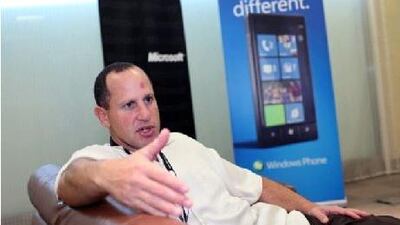A top Microsoft executive expressed doubt on the success of Apple's popular tablet device yesterday.
Steven Guggenheimer, a corporate vice president at Microsoft, said it was unclear whether there was enough investment behind tablet devices for them to emerge as a breakthrough with consumers.
"Category creation is hard," Mr Guggenheimer, who oversees the company's relationships with PC makers and other hardware companies, said on the sidelines of the GITEX technology expo in Dubai.
"Most of the [manufacturers], most of the retailers I talk to, most of the operators I talk to only want to invest into one category, either the mobile device or the PC."
Mr Guggenheimer said the company was focused on building operating systems for mobile phones and personal computers, and he did not expect it to develop any tablet devices in the near future.
"We'll see [the market] for these slates grow but it will be an extension of the PC," he said.
"What will happen is that you'll get 15 or 16 of these things with different user interfaces, all with different developer environments, all with different value propositions. The ecosystem is expanding but I'm pretty comfortable with what we have to offer."
Worldwide sales of devices such as Apple's iPad and the Samsung Galaxy Tab are expected to reach 19.4 million units this year and could grow to 208 million over the next four years, according to a recent research note from the technology consultancy Gartner.
Aside from the iPad, which helped to popularise the tablet to the mass consumer market, several other companies are about to unveil their own versions of the book-sized mobile device.
Research In Motion gave a sneak peak at its BlackBerry Playbook at GITEX on Monday, while other computer makers including HP, Samsung and Dell will soon be releasing their tablet versions.
But their success will come at the expense of other devices such as e-readers and netbooks, a lower-priced, basic version of the notebook computer.
That could affect sales of Microsoft's Windows operating system, which is installed on most of the 33.1 million netbooks sold this year.
It is a chance HP is willing to take after its acquisition of Palm last April for US$1.2 billion (Dh4.4bn).
While many industry observers questioned the deal to buy the struggling smartphone maker, HP saw Palm's WebOS operating system as a way to focus on developing internet-ready tablet devices to the market.
"The tablet isn't going to replace computers," said Antoine Barre, the vice president for HP's Middle East and Africa operations. "Everything is going to live together in the same market."
Despite the tablet sector becoming crowded with the introduction of different models, Mr Barre said the market would be wide enough for HP to gain a sizeable share.
"It's a long-term strategic move for us," said Mr Barre. "We're still in the beginning of the market so it's not about being first, it's about providing the best customer experience."
But Mr Guggenheimer is not ready to concede the tablet device is a force to be reckoned with.
"The ability to build an ecosystem [such as the tablet] is a lot of work. At the end of the day, it's super expensive," he said.
"Developing a set of hardware and software solutions to that scale is incredibly hard to do. Google or anyone else is going to make that investment but the partners that I talk to like working with us.
"They know that we've been in this business for a long time and we're going to continue to do that."

